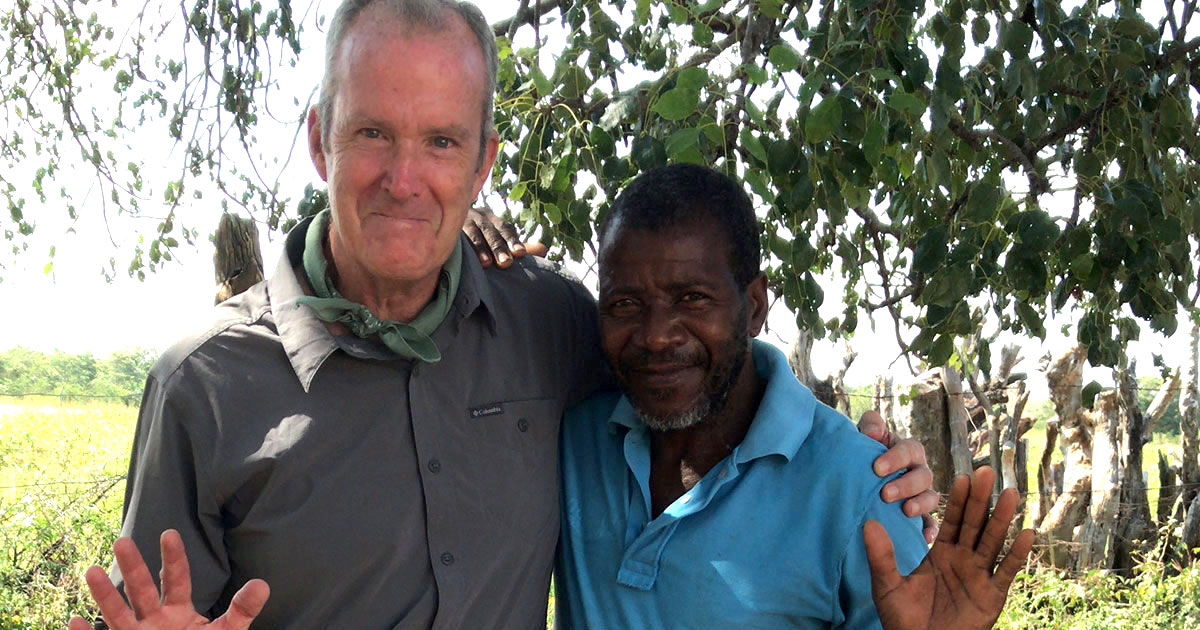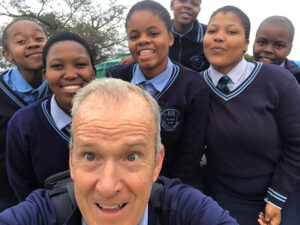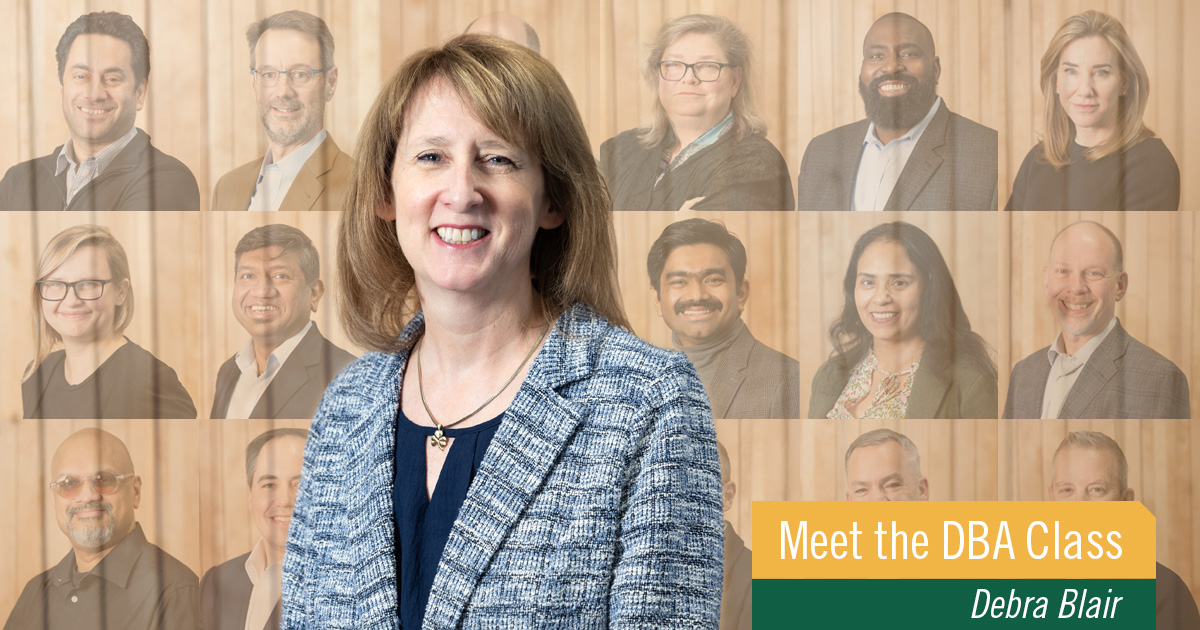Joining the Peace Corps as a Retiree: The Challenges and the Rewards

When Brian Lynch ’79 first retired in 2019, he felt something missing.
For several decades, he held senior leadership roles for a number of big-name retail brands—Walt Disney, Gap, Ann Taylor, Justice—but he didn’t want to go back to that old life. He wasn’t content with sitting on boards or being a man of leisure either.
Instead, he sought something different for his retirement, something that would fulfill him. “I felt like I was wasting my life,” he admits. “This can’t be how this thing wraps up. There is a lot more in me.”
Earlier this year, Lynch shipped off to the small African nation of Eswatini as a member of the Peace Corps. That 27-month placement, which had been delayed initially because of the pandemic, fulfilled a lifelong dream to join the global service organization, a dream he first had while studying at Babson College.
Few people Lynch’s age (he’ll soon turn 66) join the Peace Corps. “I am told all the time there aren’t many around,” he says. “The stereotypical volunteer is right out of college or recently out of college. They come with very little professional experience, but they bring a lot of heart and enthusiasm.”
By contrast, an older volunteer such as Lynch brings with him decades of life and work experience. That experience can help older volunteers weather tough circumstances and make an impact in a place where the problems are many. “I feel like I am contributing in an important way,” Lynch says. “It is rewarding. It is fulfilling. It feels like a really good chapter in my life.”
Speaking from Eswatini, where he is helping with local education and healthcare efforts, Lynch talks of the challenges and rewards of being an older Peace Corps volunteer and of how retirees, even though they have left the workplace, aren’t done making a difference.
The Challenges
Leaving home: Lynch’s three adult children encouraged him to join the Peace Corps, but the separation was hard for him and his wife, Robin. In the past, Lynch had done a lot of traveling for work, but going to Eswatini for two-plus years was something else entirely. “It’s a tough decision to live apart during my service,” he says.
Others were incredulous. “My friends think I’m out of my mind,” Lynch says. “Business associates can’t believe I’m doing it.”

Brian Lynch ’79 (bottom, center) takes a picture with some of his students from Sigcaweni High School, where he teaches life skills such as study habits and hygiene.
A Place of Poverty: The Peace Corps sends volunteers to places that need drastic help, and Eswatini is no different. About 59 percent of its population lives below the poverty line, and the country faces a high rate of HIV/AIDS.
Lynch lives in the rural village of Sigcaweni at the homestead of his host family. “They are an awesome family,” he says. As many as 14 family members live in various homes on the sprawling property, along with cows, goats, fowl, and dogs. The conditions are spartan. “You got to learn to rough it here,” he says. “There is no plumbing. There is little electricity.”
Much Work to Do: Lynch’s primary role is at the high school teaching life skills, which covers a broad range of topics: hygiene, sexual health, study habits, career counseling. He also is putting together proposals to help the cash-strapped school do much-required repairs and rebuilding. “The high school needs significant infrastructure repairs,” he says. “You name the problem, we got it.”
Additionally, Lynch is helping with improving infrastructure and organization at the deteriorating local health clinic. Taken together, he has a lot of work to do in the village.
“It’s not easy,” he says. “It’s tough to come to these areas that have nothing. You are trying to move the needle with them. They may not have hope. They certainly don’t have resources. They have dire problems.”
The Rewards
A Dream Realized: While attending Babson, Lynch had a finance professor who served in the Peace Corps. “I was fascinated by his story,” says Lynch, who considered joining right after college. Instead, he decided to get a job, and the concerns of life—career, marriage, children—soon took precedence.
Still, he never forgot about the Peace Corps, and more than 40 years after Babson, he finally joined. He encourages other Babson alumni to do the same. “The skills that Babson alumni have make them perfect for the kind of jobs, the kind of needs, that these places have,” Lynch says. “They need entrepreneurial skills.”
Experiences Put to Use: Lynch brings experiences from a lifetime to his work in Eswatini. In the past, for instance, he frequently worked with people from cultures different than his own. “You learn quickly you can’t apply the American roadmap to getting things done in India or China,” he says. “Those lessons are very helpful for me in Eswatini.”
“The skills that Babson alumni have make them perfect for the kind of jobs, the kind of needs, that these places have. They need entrepreneurial skills.”Brian Lynch '79, Peace Corps volunteer
As a business leader, he often tried to transform how his companies did things. This also is applicable to the Peace Corps. “If I didn’t have that knowledge on how to process a difficult change, I may have thought this is overwhelming,” he says. “If you can get older volunteers, who have dealt with complex problems, you come equipped to fight the good fight here.”
Considering he interacts with many young people, Lynch also leans on his experiences as a parent. “The growing-up issues are the same,” he says. “Being a parent has been amazingly helpful.”
Hands-on Work: The work of the Peace Corps is direct and hands on. That sort of work has long appealed to Lynch. “I have always been attracted to the idea I can put my fingerprints on it,” he says. “I have never walked into a situation where I could coast with the momentum of the business. I guess I have always embraced the risk and the challenges.”
There’s certainly no shortage of challenges in Eswatini. “When I go to work, I am contributing to making this better,” he says. “Not sure I will, but I am committed to it.”




